Will Deer Ticks Survive the Northeast Cold Spell
Special Stories
6 Jan 2018 3:53 PM
Temperatures in the northeast are bitterly cold following the first blizzard of 2018. Arctic air is pouring in behind the system, locking in extreme cold right through the weekend. Check out the numbers... One below zero in Burlington on Saturday. 14 below zero Sunday morning in Bangor. And still ice cold for a Sunday high in New York City, nineteen degrees.
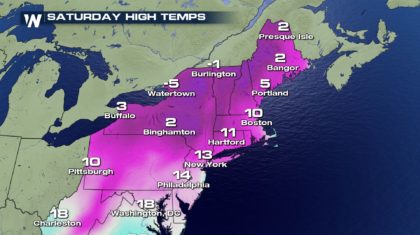
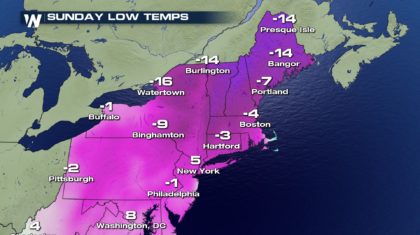
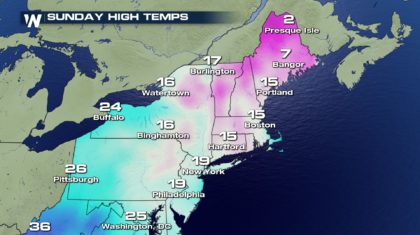 In fact, even before Thursday's winter storm, northeast temperatures have been below average for the past several weeks. Trying to find a silver lining in this tundra-like setting, one might hope that at least the tick population would be greatly reduced by the sub-freezing temperatures. Deer ticks carry Lyme disease, which has become an all too common ailment for people, especially during the summer months in the northeast. In 2015, 95% of all confirmed Lyme disease cases in the U.S. were reported in the northeast, along with Wisconsin and Minnesota. But as it turns out, ticks are very hearty little creatures. When temperatures get cold, ticks do reduce their activity, but they don't usually die.
In fact, even before Thursday's winter storm, northeast temperatures have been below average for the past several weeks. Trying to find a silver lining in this tundra-like setting, one might hope that at least the tick population would be greatly reduced by the sub-freezing temperatures. Deer ticks carry Lyme disease, which has become an all too common ailment for people, especially during the summer months in the northeast. In 2015, 95% of all confirmed Lyme disease cases in the U.S. were reported in the northeast, along with Wisconsin and Minnesota. But as it turns out, ticks are very hearty little creatures. When temperatures get cold, ticks do reduce their activity, but they don't usually die.
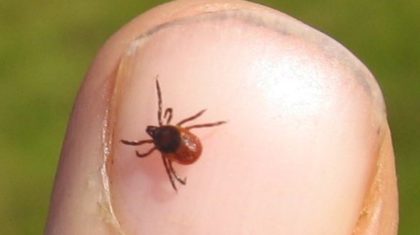 Lyme disease is carried by blacklegged ticks, also known as deer ticks. When temperatures are above freezing, ticks remain active, and continue to feed on hosts, both animal and human. When temps drop below freezing, they find shelter from the cold in leaf litter and debris in the wooded and grassy areas they inhabit. When snow covers the ground, it only helps to insulate ticks, who are protected by the layer of leaf debris. They are considered dormant in this phase. But ticks can also survive the cold by remaining latched to a host, such as a deer or moose. They stay warm from their host's body heat and hair. As a side note, other types of ticks, such as soft-shell ticks, stay warm by remaining underground in burrows or dens.
As soon as temperatures warm above freezing, dormant ticks quickly recover, and can once again attach to a host. That said, although cold periods don't kill deer ticks, they do reduce their activity. It follows that the risk of Lyme disease is lowest from late December to late March.
Lyme disease is carried by blacklegged ticks, also known as deer ticks. When temperatures are above freezing, ticks remain active, and continue to feed on hosts, both animal and human. When temps drop below freezing, they find shelter from the cold in leaf litter and debris in the wooded and grassy areas they inhabit. When snow covers the ground, it only helps to insulate ticks, who are protected by the layer of leaf debris. They are considered dormant in this phase. But ticks can also survive the cold by remaining latched to a host, such as a deer or moose. They stay warm from their host's body heat and hair. As a side note, other types of ticks, such as soft-shell ticks, stay warm by remaining underground in burrows or dens.
As soon as temperatures warm above freezing, dormant ticks quickly recover, and can once again attach to a host. That said, although cold periods don't kill deer ticks, they do reduce their activity. It follows that the risk of Lyme disease is lowest from late December to late March.
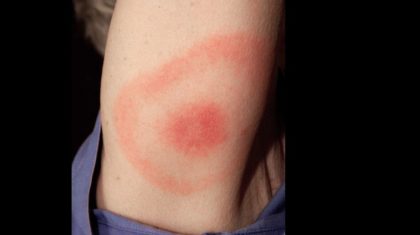 This 2007 photograph shows a rash in the pattern of a “bull’s-eye”, which manifested at the site of a tick bite on this Maryland woman’s right upper arm. She subsequently contracted Lyme disease. Lyme disease patients who are diagnosed early, and receive proper antibiotic treatment, usually recover quickly and completely. A key factor of early diagnosis is recognizing the characteristic Lyme disease rash, often in this “bull's-eye” appearance. It's observed in about 80% of Lyme disease patients. Physical symptoms typically include fever, headache, and fatigue. If left untreated, infection can spread to joints, the heart, and the nervous system, leading to serious health issues.
For more information on Lyme disease, including testing, treatment, and prevention... visit the Centers for Disease Control and Prevention website at https://www.cdc.gov/lyme/treatment/index.html
For WeatherNation... Meteorologist Matt Monroe
This 2007 photograph shows a rash in the pattern of a “bull’s-eye”, which manifested at the site of a tick bite on this Maryland woman’s right upper arm. She subsequently contracted Lyme disease. Lyme disease patients who are diagnosed early, and receive proper antibiotic treatment, usually recover quickly and completely. A key factor of early diagnosis is recognizing the characteristic Lyme disease rash, often in this “bull's-eye” appearance. It's observed in about 80% of Lyme disease patients. Physical symptoms typically include fever, headache, and fatigue. If left untreated, infection can spread to joints, the heart, and the nervous system, leading to serious health issues.
For more information on Lyme disease, including testing, treatment, and prevention... visit the Centers for Disease Control and Prevention website at https://www.cdc.gov/lyme/treatment/index.html
For WeatherNation... Meteorologist Matt Monroe


 In fact, even before Thursday's winter storm, northeast temperatures have been below average for the past several weeks. Trying to find a silver lining in this tundra-like setting, one might hope that at least the tick population would be greatly reduced by the sub-freezing temperatures. Deer ticks carry Lyme disease, which has become an all too common ailment for people, especially during the summer months in the northeast. In 2015, 95% of all confirmed Lyme disease cases in the U.S. were reported in the northeast, along with Wisconsin and Minnesota. But as it turns out, ticks are very hearty little creatures. When temperatures get cold, ticks do reduce their activity, but they don't usually die.
In fact, even before Thursday's winter storm, northeast temperatures have been below average for the past several weeks. Trying to find a silver lining in this tundra-like setting, one might hope that at least the tick population would be greatly reduced by the sub-freezing temperatures. Deer ticks carry Lyme disease, which has become an all too common ailment for people, especially during the summer months in the northeast. In 2015, 95% of all confirmed Lyme disease cases in the U.S. were reported in the northeast, along with Wisconsin and Minnesota. But as it turns out, ticks are very hearty little creatures. When temperatures get cold, ticks do reduce their activity, but they don't usually die.
 Lyme disease is carried by blacklegged ticks, also known as deer ticks. When temperatures are above freezing, ticks remain active, and continue to feed on hosts, both animal and human. When temps drop below freezing, they find shelter from the cold in leaf litter and debris in the wooded and grassy areas they inhabit. When snow covers the ground, it only helps to insulate ticks, who are protected by the layer of leaf debris. They are considered dormant in this phase. But ticks can also survive the cold by remaining latched to a host, such as a deer or moose. They stay warm from their host's body heat and hair. As a side note, other types of ticks, such as soft-shell ticks, stay warm by remaining underground in burrows or dens.
As soon as temperatures warm above freezing, dormant ticks quickly recover, and can once again attach to a host. That said, although cold periods don't kill deer ticks, they do reduce their activity. It follows that the risk of Lyme disease is lowest from late December to late March.
Lyme disease is carried by blacklegged ticks, also known as deer ticks. When temperatures are above freezing, ticks remain active, and continue to feed on hosts, both animal and human. When temps drop below freezing, they find shelter from the cold in leaf litter and debris in the wooded and grassy areas they inhabit. When snow covers the ground, it only helps to insulate ticks, who are protected by the layer of leaf debris. They are considered dormant in this phase. But ticks can also survive the cold by remaining latched to a host, such as a deer or moose. They stay warm from their host's body heat and hair. As a side note, other types of ticks, such as soft-shell ticks, stay warm by remaining underground in burrows or dens.
As soon as temperatures warm above freezing, dormant ticks quickly recover, and can once again attach to a host. That said, although cold periods don't kill deer ticks, they do reduce their activity. It follows that the risk of Lyme disease is lowest from late December to late March.
 This 2007 photograph shows a rash in the pattern of a “bull’s-eye”, which manifested at the site of a tick bite on this Maryland woman’s right upper arm. She subsequently contracted Lyme disease. Lyme disease patients who are diagnosed early, and receive proper antibiotic treatment, usually recover quickly and completely. A key factor of early diagnosis is recognizing the characteristic Lyme disease rash, often in this “bull's-eye” appearance. It's observed in about 80% of Lyme disease patients. Physical symptoms typically include fever, headache, and fatigue. If left untreated, infection can spread to joints, the heart, and the nervous system, leading to serious health issues.
For more information on Lyme disease, including testing, treatment, and prevention... visit the Centers for Disease Control and Prevention website at https://www.cdc.gov/lyme/treatment/index.html
For WeatherNation... Meteorologist Matt Monroe
This 2007 photograph shows a rash in the pattern of a “bull’s-eye”, which manifested at the site of a tick bite on this Maryland woman’s right upper arm. She subsequently contracted Lyme disease. Lyme disease patients who are diagnosed early, and receive proper antibiotic treatment, usually recover quickly and completely. A key factor of early diagnosis is recognizing the characteristic Lyme disease rash, often in this “bull's-eye” appearance. It's observed in about 80% of Lyme disease patients. Physical symptoms typically include fever, headache, and fatigue. If left untreated, infection can spread to joints, the heart, and the nervous system, leading to serious health issues.
For more information on Lyme disease, including testing, treatment, and prevention... visit the Centers for Disease Control and Prevention website at https://www.cdc.gov/lyme/treatment/index.html
For WeatherNation... Meteorologist Matt Monroe
All Weather News
More